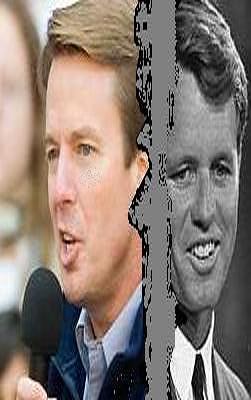I figured out recently that several of the political candidates running for President have a presence of one sort or another in a place called
Second Life.
Okay, Second Life is not really quite a "place" - unless you think cyberspace is a place. If we're standing in front of a computer talking about the history of
Timbuktu and I say, "Well, let's go to Wikipedia and see what year that was...," is Wikipedia a place? Do we really "go" there? How long does the trip take.
Second Life is a game. Like football, NASCAR, or most other games, it can be much more than a game. It can be a hobby. It can be an obsession. It can even be a way to make a living. But it's primarily a game. And it belongs to a genre of games called
virtual worlds. At any given moment, 40 or 50 thousand people are playing Second Life all over the world. There are about nine million user ID's that have been created for the game since it started in 2003.
I'm familiar with virtual worlds because I've had to write about them at my site on investment in
China. They're big business. The basic idea is that a person enters the game to interact with other players. The game is like life, in a lot of ways. But you have much more power over who you are. It's your second chance at life - a purely imaginary hobby of a life. If you're fat and fifty and bald and tired of life as a newspaper delivery man you can have a new life as an LA Lawyer, or as a Wall Street businessman, or as a 20-ish blonde beach babe with a full figure and a nice tan (if that's what you want). And whoever they are in the real world, most people in Second Life are someone else in the game, someone other than their real self.
But enough background...I wrote a
blog post after the Iowa Caucus and said that Joe Biden, Chris Dodd, and
Mike Gravel had dropped out.
Skyler McKinley from Senator Gravel's campaign staff contacted me to let me know I was mistaken, that Senator Gravel had no intention of dropping out. I'd gotten my info from MSNBC; they were wrong. Fair enough.
I Googled Skyler. Skyler goes by the name "Astrophysicist McCallister" when he's playing Second Life. I found an
interview with Skyler, or at least with Astrophysicist McCallister, by someone who calls him or her self "Pollywog Gardenvale" published a newspaper for the Second Life world. For all I know, Pollywog Gardenvale is Skyler McKinley, too (there's nothing to prevent that, I don't think); but probably not.
Skyler's interview is about Senator Gravel's campaign headquarter in Second Life.
When I saw that Skyler was the coordinator for the Gravel Campaign inside a
computer game, it reminded me of an email I got the other day from someone who finds my interest in politics at least a little humorous, I think. It was a image of a box of
Corn Flakes, and there were pictures on the box of 19 presidential candidates. The box said "Same old corn, different flakes." And along the bottom it said "Now with Added Nuts!" And I thought, "The nuts are Ron Paul and Mike Gravel..."
My first impression was that Gravel's presence in Second Life was just confirmation of his "nut" status. I like the
quote from this blog comment, "He (Gravel) is the fringiest of fringe candidates, so it probably comes as no surprise that Democrat Mike Gravel has a Second Life campaign site. What’s he got to lose?" I was wrong...
What I discovered is that
a bunch of presidential candidates have some sort of a presence in Second Life. Gravel was the first. Second was
Dennis Kucinich (okay he's
almost a nut).
Lane's List has a list of other campaign sites in Second Life and claims that Clinton, Edwards, Obama, Ron Paul, and even al Gore have political offices in Second Life. Of course, you have to develop a Second Life ID to enter Second Life and visit these virtual sites. And it's not clear which ones are actually connected, officially, to the campaigns of those candidates (or non-candidates, in the case of Gore).
One of my favorite little tidbits that I came across in studying this is that a Gravel aide in Second Life evidently
vandalized the Second Life campaign HQ of John Edwards (my first choice for President). If it's true, I hope he's in a Second Life jail somewhere...
The Internet has become incredibly social. I've found a few old high school classmates through Facebook. I'm familiar with MySpace. And even the average everyday site wants readers to comment on the site so the author can answer them and get a dialogue going.
Facebook and MySpace were intended to be places where people could advertise who they
really were. Some people abused it and pretended to be someone else to form predatory relationships. But it was mostly social reality.
Second life was started as social fantasy. Be who you
wish you were! It seems like the politicians have abused it by presenting their real selves in that context.
Newt Gingrich basically started that abuse of Second Life.
What puzzles me is why politicians would insert themselves into a fantasy, role play game in the hopes of winning supporters. It seems like wasted effort...
Is Second Life a game? In the
FAQ section of Second Life's website, question number two is "Is Second Life a MMORPG?" MMORPG stands for massively multiplayer online role playing game. And their answer is
yes (and no)...
Yes and no. While the Second Life interface and display are similar to most popular massively multiplayer online role playing games (or MMORPGs), there are two key, unique differences:
- Creativity: Second Life provides near unlimited freedom to its Residents. This world really is whatever you make it, and your experience is what you want out of it. If you want to hang out with your friends in a garden or nightclub, you can. If you want to go shopping or fight dragons, you can. If you want to start a business, create a game or build a skyscraper you can. It’s up to you.
- Ownership: Instead of paying a monthly subscription fee, Residents can obtain their first Basic account for FREE. Additional Basic accounts cost a one-time flat fee of just $9.95. If you choose to get land to live, work and build on, you pay a monthly lease fee based on the amount of land you have. You also own anything you create—residents retain IP rights over their in-world creations.
 Romney fell victim to a combination of factors. There was the fact that the Conservative vote was divided three ways. That made it easy from McCain to pull out a win in states like Missouri and Oklahoma. In a head-to-head race with just the two of them, Romney might well have beaten McCain out of those 90 or so delegates. Romney fell victim to high expectations; he was expected to do better than he did, and that made it difficult to justify staying in the race. I think Romney also fell victim to his own ambitions in as much as he's more committed to being president someday than he is to being president now. He could be perceived as having hurt the party by staying in, so he suspended his campaign.
Romney fell victim to a combination of factors. There was the fact that the Conservative vote was divided three ways. That made it easy from McCain to pull out a win in states like Missouri and Oklahoma. In a head-to-head race with just the two of them, Romney might well have beaten McCain out of those 90 or so delegates. Romney fell victim to high expectations; he was expected to do better than he did, and that made it difficult to justify staying in the race. I think Romney also fell victim to his own ambitions in as much as he's more committed to being president someday than he is to being president now. He could be perceived as having hurt the party by staying in, so he suspended his campaign.  The sales tax proposal is a bad idea because it makes taxation voluntary to the extent and degree that you can live on less than you make. Those in then upper class who make obscene amounts of money and squirrel much of it away for a rainy day (or a trip to the Italian Riviera) don't pay taxes on much of it - they get away with not paying their fair share. It also means that middle class Americans who live beyond their means by making purchase on credit cards can conceivably make pay more than their fair share in a give year; if they make $70,000 and spend $85,000 they pay taxes on the $85,000 they spent.
The sales tax proposal is a bad idea because it makes taxation voluntary to the extent and degree that you can live on less than you make. Those in then upper class who make obscene amounts of money and squirrel much of it away for a rainy day (or a trip to the Italian Riviera) don't pay taxes on much of it - they get away with not paying their fair share. It also means that middle class Americans who live beyond their means by making purchase on credit cards can conceivably make pay more than their fair share in a give year; if they make $70,000 and spend $85,000 they pay taxes on the $85,000 they spent. The source of the misinformation was
The source of the misinformation was  Romney and Huckabee are in a death struggle for the conservative religious vote. Romney has now lost twice in states where he was supposed to win; but he probably won't go away. Huckabee did better than expected in N.H. and is sneaking up on Romney in Michigan (next up, January 15). If Huckabee wins Michigan and South Carolina (January 19 for the GOP), I think Romney is toast. If Romney wins Nevada (far from certain) on January 19, that may take the edge off the defeat; but Romney has to win Michigan or South Carolina to stay alive, I think.
Romney and Huckabee are in a death struggle for the conservative religious vote. Romney has now lost twice in states where he was supposed to win; but he probably won't go away. Huckabee did better than expected in N.H. and is sneaking up on Romney in Michigan (next up, January 15). If Huckabee wins Michigan and South Carolina (January 19 for the GOP), I think Romney is toast. If Romney wins Nevada (far from certain) on January 19, that may take the edge off the defeat; but Romney has to win Michigan or South Carolina to stay alive, I think.  The last I looked, Hillary had a small lead in New Hampshire. And I believe NH is a winner-take-all state, unlike Iowa...
The last I looked, Hillary had a small lead in New Hampshire. And I believe NH is a winner-take-all state, unlike Iowa... Could John Edwards be the reincarnation of Bobby Kennedy?
Could John Edwards be the reincarnation of Bobby Kennedy? 

